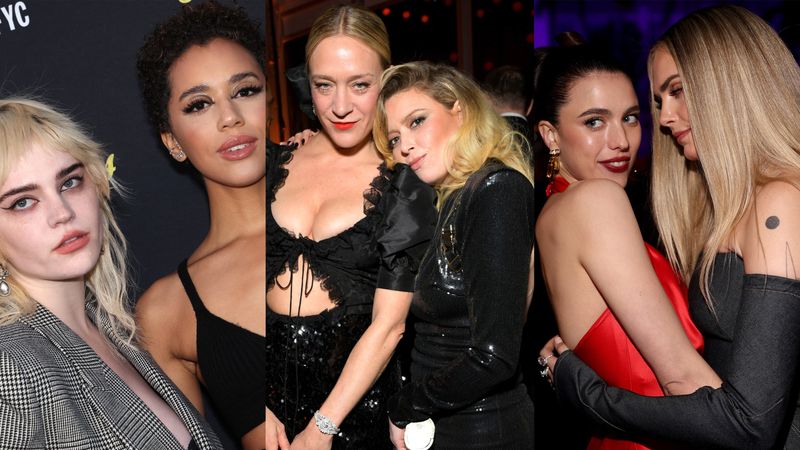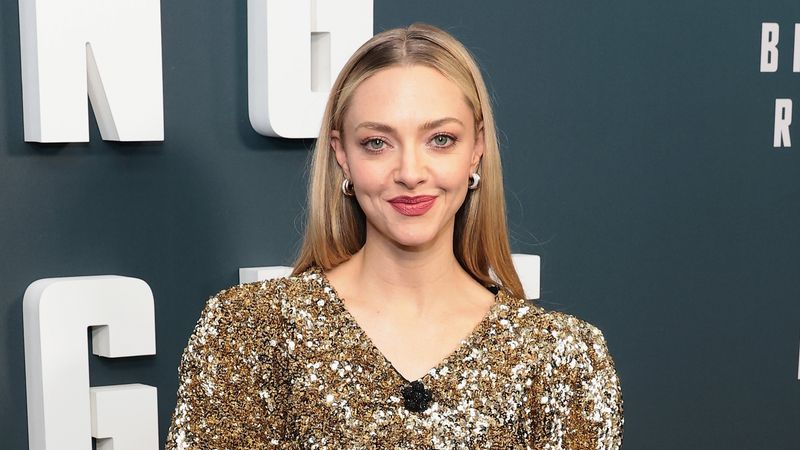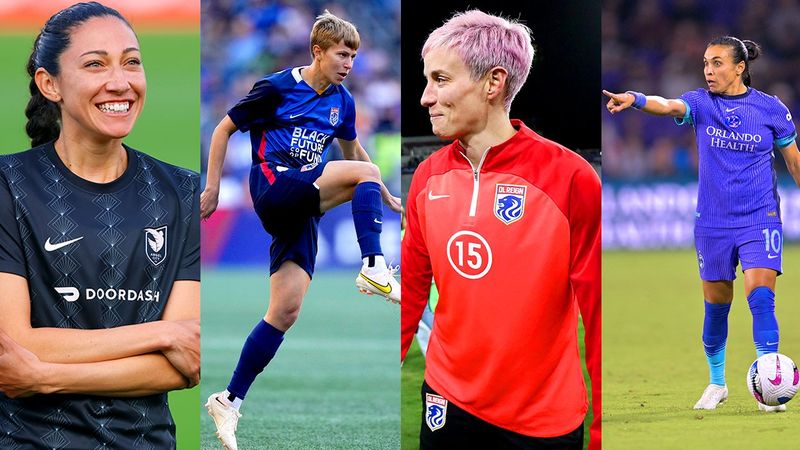In the often crazy world of Litchfield, OITNB's hairdresser Sofia Burset and chef Gloria Mendoza, portrayed by Laverne Cox and Selenis Leyva, have proven to be two of the strongest, most graceful characters on the show. And once we learned the writers are often influenced by the actresses themsleves, it's not hard to understand why. We were lucky enough to sit down with two of OITNB's fiercest inmates and learn a little more, not only about their characters, but life in the intense spotlight the show has created for them. As Laverne (and Spiderman's uncle) says, "With great power comes great responsibility." And the cover of Time Magazine, apparently!
(RELATED: OITNB's Samira Wiley and Danielle Brooks, on Celebrity and Foreign-Language Sex Scenes)
Now, onscreen and off you both have become a little bit more visible since the first season.
Laverne: Little bit? You think?
What’s been the most exciting part of that success, and what has been the most challenging?
Selenis: For me, it’s been pretty awesome! I’ve done a lot of TV and other work, and I thought before this when I did my episode on Girls, I got a lot of attention. But Orange it’s been on another level of insanity. I’m very grateful. I get excited for people who come to me and they’re excited, because I’m like, ‘Wow! You’re so happy to see me! This is good, this is making my day!’ I think my daughter is a little bit freaked out by it. We went to the movies yesterday and a bunch of teen girls came to us, and she got freaked out by that.
Laverne: It’s scary.
Selenis: And I said, ‘I know sweetheart, it’s scary, but Mama’s life has changed.’ We also have a responsibility that comes with success and celebrity. I have to be careful what I say and what I do, not only because I have a child who’s 11 years old who's always looking at me, but because now I have hundreds and thousands of people watching.
Laverne: You’ve got millions, girl.
Selenis: (laughs) Millions! And as an Afro-Latina actress, I feel even more responsibility because I’m in this show that’s entertaining, but at the same time, it’s starting all these wonderful conversations about different types of people and different situations, so it’s lovely. And bring it, I’m ready for more!
What movie did you see?
Laverne: I wanted to ask her too!
Selenis: The Fault in Our Stars!
Laverne: I met John Green who wrote the book, he’s amazing. What did you think of the film?
Selenis: So good! The actors are fantastic. I cried! And as I’m trying to sneak out cause I see people looking at me, I was like, ‘God!’
Laverne: Did they stop you in the bathroom, girl?
Selenis: They did!
Laverne: You know, I’m like, ‘Can I pee and wash my hands?’
Selenis: It’s sweet!
Laverne: It’s sweet, but it's like...I guess for me, it's hard for me...I don’t often think, ‘Okay, I have to be ready to receive love right now,’ every time I leave the house.
Selenis: Well, get ready.
Laverne: I’m not, I’m really not. I’m a New Yorker, and a lot of times I want to go to Duane Reade and buy my toilet paper and my false eyelashes and get in and get out. What’s interesting for me is before I was on a hit TV show I didn’t talk to strangers on the street unless they were really cute men. And so now I don’t want to talk to strangers on the street either, that has not changed. And now I feel like, ‘Oh my God, people are going to say Laverne’s a bitch, or Laverne’s awful, cause she didn’t talk to me or she didn’t take a picture.’
Selenis: I like it that people are nicer to me! I’m taking advantage of that.
Laverne: Well...
Selenis: People are nice! They’re sending me free stuff, drinks!
Laverne: The love is great. I guess it’s just about boundaries for me. When I go to events and stuff, it becomes work and not wanting to disappoint people, because I know people have projected all sorts of things onto me and I don’t want to disappoint them. And that’s what I’m hyper aware of- of not wanting to disappoint them, but also wanting to just be a human being. There’s a moment in Beyonce’s I am Sasha Fierce tour at the very end - I know, right? Beyonce, it always goes back to Beyonce! - but it said ‘I Am’ for the most the concert, and then at the very end it said, ‘I Am Yours.’ And I was like (fangirling), ‘Yes, we are yours Beyonce! Yes, you belong to us!’ And then I was like, that’s lovely as a fan, but I don’t want to live that way where I belong to the fans, because that’s a huge responsibility. I guess I’m feeling the responsibility piece too in a really intense way, and it’s really heavy. It’s been really important to me to find spaces to laugh and to be irreverent and not take on all that responsibility. And there’s so many amazing trans folks out there doing amazing work. They need to get attention too.
Do you know if the the show actually inspired any changes in the prison system for transgender people?
Laverne: That’s a good question. Not that I’m aware of. What I am aware of is that more conversations are happening about trans folks in prison. Interesting enough, the Prison Rape Elimination Act, PREA, went into effect last year, but that had nothing to do with our show. It was about ten years ago that they instituted the Prison Rape Elimination Act, and then they started for a decade studying how to implement it. It’s an act that is a suggestion, so it’s not even really law. In federal prisons anything that gets federal funding will lose funding it is not up to code. For PREA, obviously it’s about eliminating sexual assault in prison, but it has specific guidelines about where trans people should be housed, how they should be housed, they should not be searched basically just to determine what there genital status is. They should be housed on a case-by-case basis, those sorts of things. And reporting sexual assault, how we should go about that. So there’s an implementation process, it takes time, but the ACLU has been doing a lot of work. They have a great tool guide as a resource for advocates to say, ‘This is how you should be implementing PREA.’ So it’s exciting, but prison abolitionists will say, well great, we shouldn’t be raping people in prison, but maybe so many people shouldn’t be incarcerated in the first place. And why are people incarcerated? And we should be looking at getting rid of prisons instead of trying to make prisons safer. Anyway, diatribe!
You both talked about how you sort of feel like you’re advocates now. Do you ever find it difficult to balance that with the fact that you just want to be an actor? How do you keep that balance?
Laverne: Yes.
Selenis: I think for you it’s fallen more in that realm, because a lot of people are looking to you to be the...mouthpiece? Did someone tell you you were a mouthpiece?
Laverne: But I chose to speak out. Let’s keep it real, I chose to speak out and I continue to choose to speak out about things that are important to me and where I see injustice. So, I’ve chosen that, but I’m an actor and I’m an artist first, so I have to make decisions first based on that, so there are certain issues that I can’t talk about. Controversies out there that I have to leave to other people because I’m an artist. I have to be very deliberate about everything. For me it’s about choosing very carefully which battle I’m going to go for. But it’s been great, getting to do a documentary about CeCe McDonald, and when I was on the Katie Couric show the last time I was like, ‘We’re doing a whole segment about CeCe McDonald, a black trans woman who spent 19 months in a 41-month prison sentence in a men’s prison for defending herself.' And we did a whole segment on Katie Couric on network television about that.
Selenis: Daytime, right?
Laverne: Daytime! And we talked about Jane Doe, a sixteen-year-old girl who is incarcerated in Connecticut and she’s not been charged with a crime, and she’s in solitary confinement since April. Not. Charged. With. A. Crime. It’s insane to me! I got to talk about that on national television, and that makes me happy. I’d really be happy if we could get this girl out of prison, so hopefully more people will know about that and we’ll get some justice for people.
Do you get any feedback on the show from real inmates?
Selenis & Laverne: Yes.
Selenis: Especially for us, communicating with people from the Women’s Prison Association, we’ve had galas and events we’ve been involved in where former inmates can come and interact with us, and it’s been amazing. What I love about it is they’re saying, ‘Thank you for giving voices to us and our stories,’ and a lot of those things that I thought, ‘Oh, is that for sensational writing?’ Like the C.O. and the love affairs - very true. This one woman gave it to me, a story kind of like Daya and Bennett. A guard fell in love with her and they had an affair and I was just like, 'Wow! So it does happen!'
Laverne: I remember I was in Union Square last summer and this woman runs up to me - people are always running up to me on the street - this woman runs up to me and was like, ‘Oh my god, you were in Orange is the New Black! I was in prison!’ And I don’t want to stigmatize or judge because I understand that just because you’re incarcerated does not mean that you are actually a criminal. People are in jail for all kinds of crazy stuff that they shouldn’t be in jail for. But I was like, ‘Does our show resonate true for you?‘ She had been in for two years, and she said, ‘Absolutely. The humor, absolutely.’ It’s crazy! It’s a crazy thing being in prison, and a lot of times it just gets irreverent- she didn’t say ‘irreverent’, I’m paraphrasing- but it gets irreverent because it just has to because it’s so ridiculous that you have to laugh. Or you’re gonna just be crying all the time.
This season, Gloria is in a position of power, but she seems to be a little less scheming than the other women in power. How does she avoid letting that pressure her in the same way?
Selenis: I think the beauty of season 2 is that you not only get to see more of Gloria, but you get to see that she’s a woman who really just doesn’t want any problems. She just wants to do her job, keep it moving, no drama. The fact that she’s in the kitchen and so much drama comes into the kitchen and revolves around the kitchen is interesting and is great to fun to play, because we get to see her do this love/hate thing with the kitchen.
Laverne: She seems to also, like Sophia, really get joy from cooking.
Selenis: She does! She likes it. It’s about family. So, she’s in there with her girls and there’s Latin music playing and there’s food and- it’s just home. It’s just family. So I think that that’s really lovely for her. But she doesn’t realize that (laughs) a lot comes with the kitchen
Laverne: Yes. With great power comes great responsibility.
But she seems to handle it very well.
Selenis: She does! But I think that sometimes she just wants to kick everyone out and cook. Just leave her alone! She’s simple. Gloria’s a very simple woman. Just let me do my job and keep it moving!
Gloria’s such a strong presence in the prison. So how was working with that shift to find that other side of her for her backstory where she’s the victim of domestic violence?
Selenis: I think that’s what I loved as an actor when I had the chance to do that. To play such extremes. And what I love is that- even for myself when I read the script, and I saw what was coming as far as my relationship outside of prison- what happens with her and her boyfriend, I was shocked. I wasn’t expecting that. And I think that’s the beauty of the writing, is that you see this strong woman and you think, ‘She would never - she would never put up with that!’ But a lot of us put up with a lot of things that we never would. And sometimes love makes you put up with a whole lot of crap.
Laverne: I think a lot of women end up in those situations because they think that’s what they deserve. So it’s not even about how strong you are or not strong, it’s about what you think you deserve. I know for me I’ve been in relationships I shouldn’t have been in but I thought that that’s what I deserved.
Do you find it exciting as actors to not know so much about your going into a season, or does that sort of keep you on your toes apprehensively?
Gloria: For me, first season was always about being on my toes and not know. I was kind of like blind. But I was able to create my own little story. And I think that the writers and I were able to create and develop Gloria. Gloria was one of those characters that they really didn’t see. She was there, she was going to have her moments and that’s it. They had no idea she was going to take over the kitchen. Jenji (Kohan, the show's creator) told me, ‘You made us write for you.’ And when Jenji Kohan says, ‘You made us write for you,’ I was like...I could now be done. And scene! So that’s lovely that I was able to get them to listen and pay attention and create, but for me literally what helped me develop Gloria was the coconut line in the first episode. When I said the coconut line and, ‘Even the white girl speaks Spanish,’ I knew that there was fierceness, a sass about Gloria. She was proud to be a Latin woman. So all of that helped, and that’s who she is. And that’s who she’s staying, even with the backstory being as sad as it is. She’s strong, there’s still a fierceness and there’s definitely pride in being Latina so that helped a great deal. That one line!
We got to see a bit more of Sophia’s son this season, and it was such an uplifting, happy scene when you were playing cards.
Laverne: It was so emotional! It’s funny, because I get so much direction of, ‘Don’t cry, don’t cry, don't cry!’ I think that was most of my direction for season one: Don’t cry. No, I’m kidding. But I was really emotional that day, and I remember I prepped, but I didn’t prep too much cause I just wanted to be in the moment. For me, those are the things that I dream of as an actor, getting to have these really complicated moments. It’s this moment of, okay, he’s finally here, how is this going to go? Is he going to come back? I want to hug him.
Selenis: That’s the beauty of the writing! It goes nice and slow in real life pace. It didn’t end with oh, he hugged you, everything is back to normal!
Laverne: We still don’t know what’s going to happen. But then it’s real, because how do you make this right? Do you make it right, in terms of repairing relationships with family? There’s an abandonment that’s happened because Sophia’s no longer his father, and there’s an abandonment that Sophia’s no longer there because she’s incarcerated, so there’s this stigma attached to that. I think parents have a need to connect and bond. I just think about my mom and it’s...it’s guttural.
Selenis: And that’s the beautiful thing about your portrayal of Sophia - those moments that you have with your son and your wife because, as a mom, I go, ‘She’s a freaking fabulous actress!’ Because I know she doesn’t have kids-
Laverne: But I have a mother.
Selenis: And I believe every second of it. I think, again, the writing on this show is amazing. And then, you know, the acting is alright!
The character of Vee certainly changed the dynamics-
Selenis: She devil!
She never goes after Sophia though. I was so surprised.
Laverne: It’s funny, there was actually a scene that was cut where she came to my salon- where I tried to force her into my salon, actually- and she was like, ‘No, I don’t want your relaxer, I don’t want anything to do with that!’ And Sophia really wants to get her hands on that hair! It ended up being cut because of timing. But there’s a moment where Sophia takes contraband from Red, so it’s almost like in that moment she’s taking sides. And obviously Vee has some homophobia too. But I don’t think that’s about homophobia, I think that’s really about power and dividing and conquering. It’s written so brilliant and Lorraine is just pitch perfect. I feel like, Selenis, you need your Emmy now, and Lorraine needs her Emmy. Danielle and Uzo and Poussey, and, oh my God, Yael; everybody needs an Emmy!
Lavenre and Selenis with the cast at the GLAAD Awards
Nominations are coming out next month. What would it mean for the show or any of the actresses to get a nomination?
Selenis: It would be lovely to get the recognition, especially on a show like this where it’s not your typical show. It’s not your typical cast. This is a diverse cast and it’s never happened, so to get recognition would be divine.
Laverne: I watch a lot of television and there are some great roles for women on TV right now, but I’ve never seen a female cast this dynamic and this talented.
Selenis: And the writing is so good!
Laverne: It starts with the writing, we can’t do anything if there’s no writing. But every single actress is bringing it hard on the show, so I think everyone deserves awards.
When you got your hands on the script for the very first time, did you know that you would be embarking on such an important journey, both for you as actors and for the world, going so far as to potentially change the prison system?
Selenis: No, not at all.
Laverne: No. The pilot script was brilliant, though. I only saw that script before I was hired.
Selenis: And Jenji Kohan is an amazing writer. She’s the creator of Weeds, I was such a fan of the show. So I knew that the writing was going to be superb and the pilot episode was wonderful.
Laverne: I had never seen anything like it! Pornstache? But the descriptions in the script were so detailed. It was like a novel, almost, the way she writes. You can see it!
Selenis: It was so layered. I was like, this can’t just be an hour! This has to be like, three part series every day! Every episode needs to be a three-parter!
Laverne: A lot happens in an episode of Orange is the New Black. So, I was really excited. You never know if the audience is going to latch on.
Selenis: We didn’t know who was going to watch. We had no idea.
Laverne: Because there’s just never been anything like it. So you can't say, 'Well, this is a little bit like this show, so this demographic is going watch.'
Selenis: But everyone’s watching, so that’s a good thing!




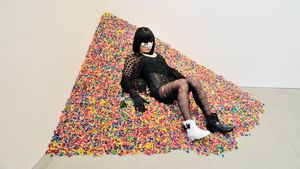





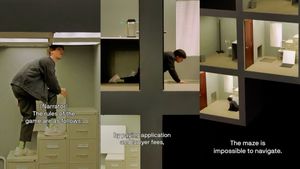












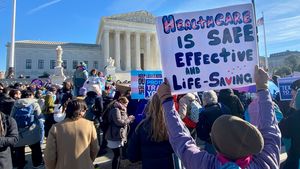






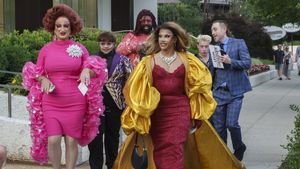




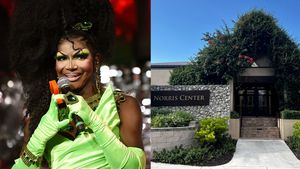





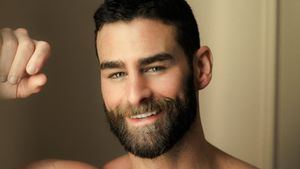



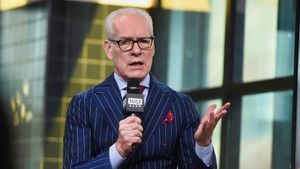






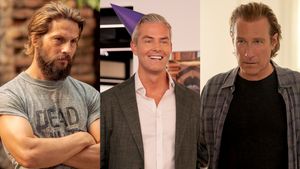




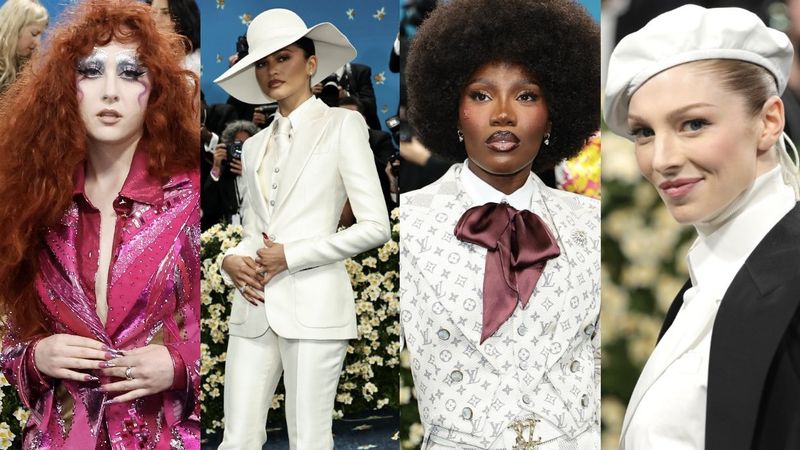



































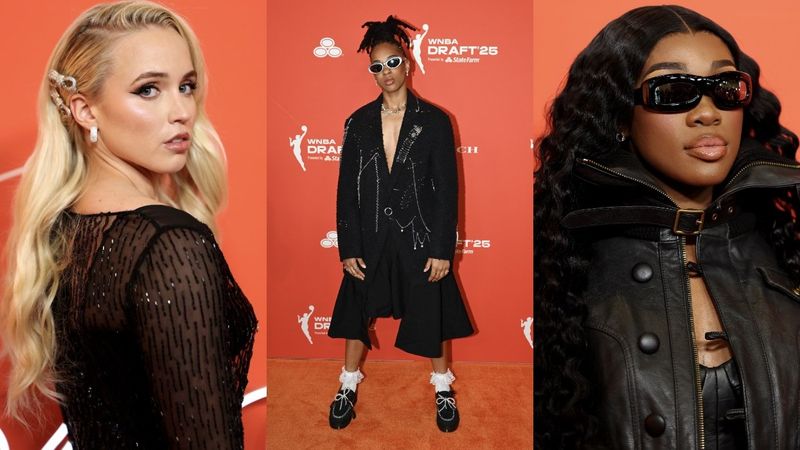
 Cindy Ord/Getty Images
Cindy Ord/Getty Images










